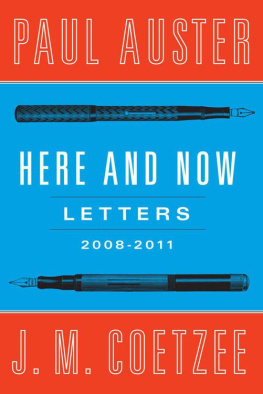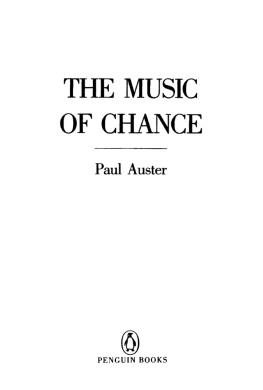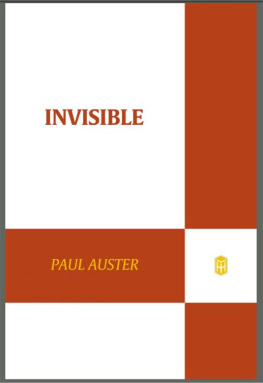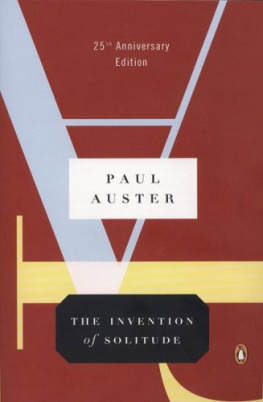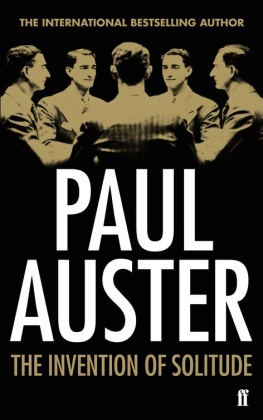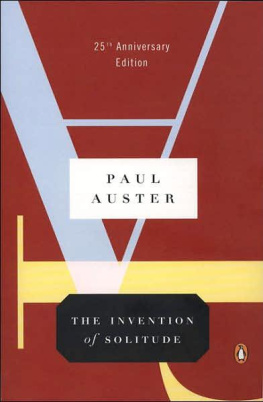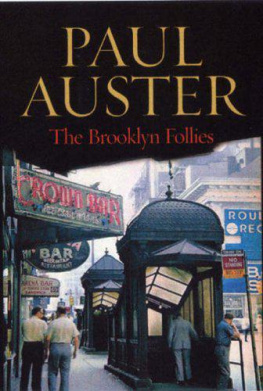ALSO BY PAUL AUSTER
The Invention of Solitude
The New York Trilogy
In the Country of Last Things
Moon Palace
The Music of Chance
Leviathan
Mr. Vertigo
Smoke & Blue in the Face
Hand to Mouth
Lulu on the Bridge
Timbuktu
The Book of Illusions
Collected Poems
The Red Notebook
Oracle Night
Collected Prose
The Brooklyn Follies
Travels in the Scriptorium
The Inner Life of Martin Frost
Man in the Dark
Invisible
Sunset Park
Winter Journal
ALSO BY J. M. COETZEE
Dusklands
In the Heart of the Country
Waiting for the Barbarians
Life & Times of Michael K
Foe
White Writing
Age of Iron
Doubling the Point: Essays and Interviews
The Master of Petersburg
Giving Offense
Boyhood: Scenes from Provincial Life
The Lives of Animals
Disgrace
Stranger Shores: Essays 19861999
Youth
Elizabeth Costello
Slow Man
Inner Workings
Diary of a Bad Year
Summertime
VIKING
Published by the Penguin Group
Penguin Group (USA) Inc., 375 Hudson Street,
New York, New York 10014, U.S.A.
USA / Canada / UK / Ireland / Australia / New Zealand / India / South Africa / China
Penguin Books Ltd, Registered Offices: 80 Strand, London WC2R 0RL, England
For more information about the Penguin Group visit penguin.com
First published in 2013 by Viking Penguin,
a member of Penguin Group (USA) Inc.
Copyright Paul Auster, 2013.
Copyright J. M. Coetzee, 2013.
All rights reserved.
No part of this book may be reproduced, scanned, or distributed in any printed
or electronic form without permission. Please do not participate in or encourage piracy of copyrighted materials in violation of the authors rights. Purchase only authorized editions.
LIBRARY OF CONGRESS CATALOGING-IN-PUBLICATION DATA
Auster, Paul, 1947
Here and now : letters (2008-2011) / Paul Auster and J. M. Coetzee.
p. cm.
ISBN 978-1-101-60627-8
1. Auster, Paul, 1947Correspondence. 2. Authors, American20th centuryCorrespondence. 3. Coetzee, J. M., 1940Correspondence. 4. Authors, South African20th centuryCorrespondence. I. Coetzee, J. M., 1940 II. Title.
PS3551.U77Z48 2013
816'.54dc23
2012039755
Contents
Contents
HERE AND NOW
July 1415, 2008
Dear Paul,
I have been thinking about friendships, how they arise, why they lastsome of themso long, longer than the passional attachments of which they are sometimes (wrongly) considered to be pale imitations. I was about to write a letter to you about all of this, starting with the observation that, considering how important friendships are in social life, and how much they mean to us, particularly during childhood, it is surprising how little has been written on the subject.
But then I asked myself whether this was really true. So before I sat down to write I went off to the library to do a quick check. And, lo and behold, I could not have been more wrong. The library catalog listed whole books on the subject, scores of books, many of them quite recent. But when I took a step further and actually had a look at these books, I recovered my self-respect somewhat. I had been right, or half-right, after all: what the books had to say about friendship was of little interest, most of it. Friendship, it would seem, remains a bit of a riddle: we know it is important, but as to why people become friends and remain friends we can only guess.
(What do I mean when I say that what is written is of little interest? Compare friendship with love. There are hundreds of interesting things to say about love. For instance: Men fall in love with women who remind them of their mothers, or rather, who both remind them and dont remind them of their mothers, who are and are not their mothers at the same time. True? Maybe, maybe not. Interesting? Definitely. Now turn to friendship. Whom do men choose as friends? Other men of roughly the same age, with similar interests, say the books. True? Maybe. Interesting? Definitely not.)
Let me list the few observations on friendship, culled from my visits to the library, that I found of actual interest.
Item. One cannot be friends with an inanimate object, says Aristotle (Ethics, chapter 8). Of course not! Who ever said one could? But interesting nevertheless: all of a sudden one sees where modern linguistic philosophy got its inspiration. Two thousand four hundred years ago Aristotle was demonstrating that what looked like philosophical postulates could be no more than rules of grammar. In the sentence I am friends with X, he says, X has to be an animate noun.
Item. One can have friends without wanting to see them, says Charles Lamb. True; and interesting tooanother way in which amical feelings are unlike erotic attachments.
Item. Friends, or at least male friends in the West, dont talk about how they feel toward each other. Compare the garrulity of lovers. Thus far, not very interesting. Yet when the friend dies, what outpourings of grief: Alas, too late! (Montaigne on La Botie, Milton on Edward King). (Question: Is love garrulous because desire is by nature ambivalentShakespeare, Sonnetswhile friendship is taciturn because it is straightforward, without ambivalence?)
Finally, a remark by Christopher Tietjens in Ford Madox Fords Parades End: that one goes to bed with a woman in order to be able to talk to her. Implication: that turning a woman into a mistress is only a first step; the second step, turning her into a friend, is the one that matters; but being friends with a woman you havent slept with is in practice impossible because there is too much unspoken in the air.
If it is indeed so hard to say anything of interest about friendship, then a further insight becomes possible: that, unlike love or politics, which are never what they seem to be, friendship is what it seems to be. Friendship is transparent.
The most interesting reflections on friendship come from the ancient world. Why so? Because in ancient times people did not regard the philosophical stance as an inherently skeptical one, therefore did not take it as given that friendship must be other than it seems to be, or conversely conclude that if friendship is what it seems to be, then it cannot be a fit subject for philosophy.
All good wishes,
John
Brooklyn
July 29, 2008
Dear John,
This is a question I have given much thought to over the years. I cant say I have developed any coherent position about friendship, but in response to your letter (which unleashed a whirlwind of thoughts and memories in me), perhaps this is the moment to try.
To begin with, I will confine myself to male friendship, friendship between men, friendship between boys.
1) Yes, there are friendships that are transparent and unambivalent (to use your terms), but in my experience not many of them. This might have something to do with another one of the terms you use: taciturn. You are correct to say that male friends (at least in the West) tend not to talk about how they feel toward each other. I would take this one step further and add: men tend not to talk about how they feel, period. And if you dont know how your friend feels, or what he feels, or why he feels, can you honestly say that you know your friend? And yet friendships endure, often for many decades, in this ambiguous zone of not-knowing.
At least three of my novels deal directly with male friendship, are in a sense stories about male friendshipThe Locked Room, Leviathan, and
Next page
